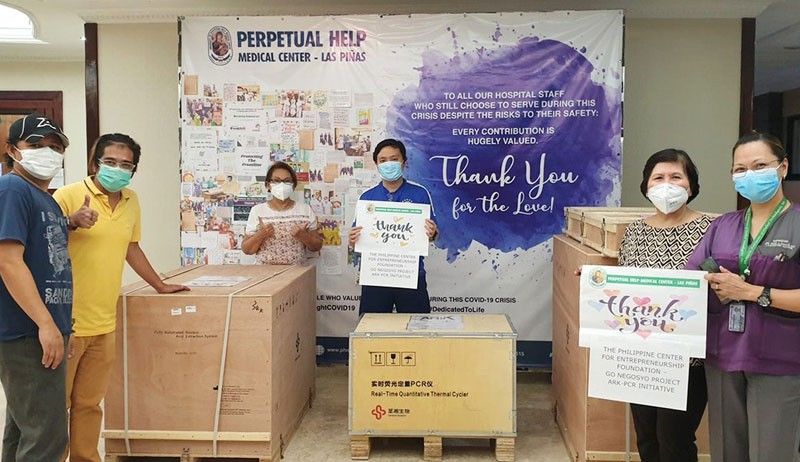Garin defends combined use of rapid, PCR tests

MANILA, Philippines — Former health secretary and now Iloilo congresswoman Jannette Garin has defended the combined use of rapid tests and reverse transcription-polymerase chain reaction (RT-PCR) machines which have been launched with the help of Presidential Adviser for Entrepreneurship Joey Concepcion.
“This virus is new, we are in a pandemic of unknown proportions. This is not the time for finger-pointing and bringing down one another. We need to help each other,” the senior House Deputy minority leader said yesterday in a mix of Filipino and English.
“From my perspective, both rapid antibody test kits and RT-PCR have their own strengths and weaknesses. Both can complement when used properly so that transmission can be intercepted,” Garin, an ob-gyne by profession, stressed.
The project of Concepcion – dubbed as the “Project ARK-PCR Initiative” – has resulted in the automation of six hospitals, and the automation of six more laboratories in the hospitals or health facilities.
“With the ongoing rate of COVID-19 transmission in the country, the need to work together is crucial. Both the government and the private sector must work hand-in-hand to save more Filipinos from contracting the virus,” Garin declared.
“In the initial stages of our response, many believed that PCR swab testing was expensive and difficult. While it is indeed not that easy to set up biosafety level 2 laboratories, we are catching up especially with the whole of nation approach,” Garin added.
Among the additional hospitals to be automated are Cebu Molecular Laboratory, Eastern Visayas Regional Medical Center, Jose B. Lingad Regional Medical Hospital, Negros Occidental Provincial Hospital, Perpetual Hospital in Las Piñas and Laguna, Philippine Children’s Medical Center, Western Visayas Medical Center, Zamboanga City Medical Center, Baguio General Hospital, Bicol Public Health, Lung Center of the Philippines, and the National Kidney and Transplant Institute.
This assures an additional 10,000 RT-PCR test per day by the end of May. By the middle of June, the initiative will have an additional 7,000 tests, and by the end of June another 7,000 tests daily.
Project ARK’s PCR Initiative will be generating additional 24,000 tests per day by the end of June, complementing the government’s testing capacity.
Adequate swab testing centers will also be available for those who will turn out positive in the Rapid Antibody Testing project of ARK – an avenue that paved the way for contact tracing in areas where there were silent transmissions.
In the coming weeks, Go Negosyo, Ayala Foundation and San Miguel Foundation, together with the House of Representatives, will be activating and automating more laboratories such as Adella Serra TY Memorial Medical Center, Bataan General Hospital and Medical Center, Bicol Regional Diagnostic and Reference Laboratory, Bohol Gallares Hospital, Butuan Medical Center, Cagayan de Oro Medical Center, Cotabato Regional Medical Center (CRMC), Dr. Jose Fabella Memorial Hospital, Dr. Jose N. Rodriguez (Tala) Memorial Hospital and Sanitarium, General Santos Medical Center, Ilocos Training Regional Medical Center, Isabela Doctors General Hospital, La Union Medical Center, National Center for Mental Health (NCMH), NKTI, Northern Mindanao Medical Center (NMMC), Ospital ng Palawan, Perpetual Hospital-Biñan, Quirino Memorial Medical Center, San Lazaro Hospital (SLH), UERM Memorial Medical Center, and West Visayas State University Medical Center.
Accreditation for faster testing
Vice President Leni Robredo on Sunday urged the government to allow private institutions as well as the University of the Philippines to accredit laboratories to speed up the testing of Filipinos for coronavirus disease 2019 (COVID-19).
Robredo made the appeal on her weekly program on dzXL as thousands of overseas Filipino workers (OFWs) who have arrived in the country as early as last month remained in Metro Manila quarantine facilities and hotels while waiting to be tested.
“If there are only few who can accredit, why don’t they allow the private sector to help in the accreditation of these laboratories. There are many experts who want to help, including educational institutions like the UP,” she said.
Carlito Galvez Jr., chief of the National Task Force against COVID-19, said the government plans to put up additional 61 testing laboratories nationwide to meet its target of 30,000 polymerase chain reaction tests per day by the end of this month.
However, with less than 10,000 tests for COVID-19 being conducted daily, the Philippines appears unlikely to reach its target testing capacity by the end of May.
Data from the Department of Health (DOH) showed that as of May 22, the country’s daily testing capacity is pegged at 9,516, or way below the target 30,000 tests per day.
Nationwide, there are 34 licensed laboratories equipped to perform RT-PCR tests and eight laboratories using GeneXpert cartridges.
Of the 34 licensed laboratories, the Research Institute for Tropical Medicine (RITM), which is the country’s National Reference Laboratory, posted the highest testing capacity of 1,760 daily. The Philippine Red Cross (PRC) recorded the second highest testing capacity of 900 daily.
The National Task Force (NTF) for COVID-19 and the DOH previously vowed to increase the country’s testing capacity to 30,000 per day by May 30.
Health Undersecretary Maria Rosario Vergeire said increasing the testing capacity is crucial in ending the pandemic as it will enable authorities to immediately isolate people with COVID-19.
“Early detection and isolation of new cases is critical to managing potential outbreaks,” Vergeire explained.
For the targeted two million tests, Sen. Franklin Drilon said the new rate of P4,210 per test will still result in potential loss of P1.4 billion.
“PhilHealth should look at lowering it to P3,500, or perhaps even lower. I have heard that some institutions can do it at as low as P2,000,” he said over the weekend, referring to the Philippine Health Insurance Corp.’s (PhilHealth) efforts to ramp up testing for the coronavirus. Helen Flores, Mayen Jaymalin, Paolo Romero, Louella Desiderio
- Latest
- Trending






























